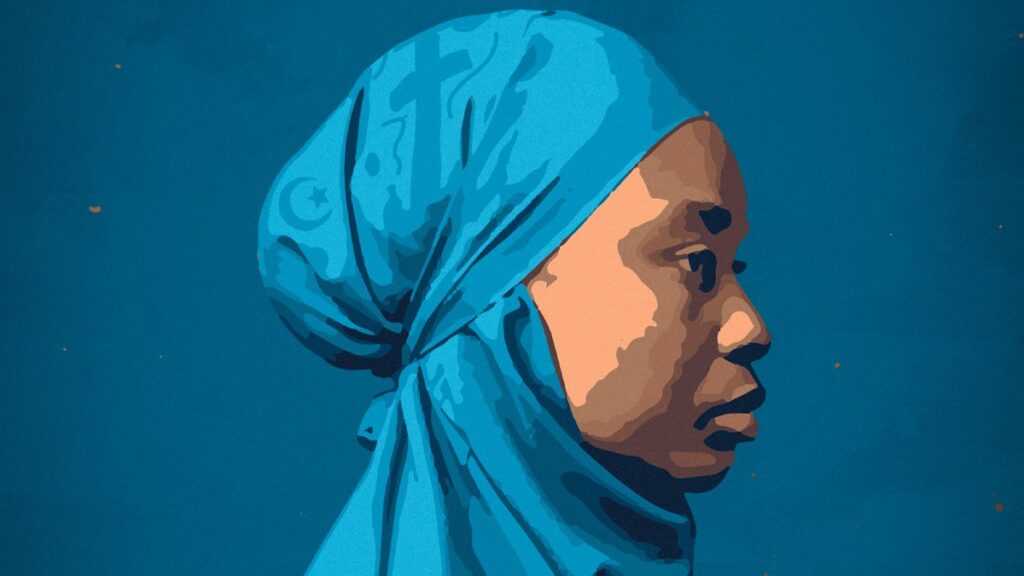by Akinwande Jordan.
The double feature of grief.
The sorrow in With Difficulty Comes Ease by Korede Azeez reaches us not as a single spy but in battalions. We are solemnly presented with a fiery rumination on the undying contagious nature of grieving. Tonally, it is a mild contrast to Azeez’s debut feature it blooms in June released earlier this year; where she entangles the aftermath of the loss of a father with a joyful narrative that soothes the overall gloom. Not many directors embark on the feat of two films in one year — this is either a testament to her productive ingenuity or a creative ultra-drive to rehash that which was previously treated in her debut with a grim and mournful mise-en-scene.
Dysfunction, parallels and the sutures of healing.
A paraphrased title derived from the Quranic verse from the Surah Al-inshirah (94:5-6)— we have here a religious meditation and a pensive story, in Islamic parlance; a cinematic Dhikr. Zainab (Uzoamaka Aniuhoh) , a widowed woman of Igbo and Hausa descent, whose mourning period is strained by her dysfunctional relationship with Hajiya (Ummi Baba-Ahmed) , her antagonistic mother-in-law, a widowed woman herself with whom she resides. In the gloomy aftermath of the demise of her husband, Qasim, she forges an intimate yet indeterminate friendship with Rayyan (Caleb Richards) , who acts less as a placeholder for what was lost and takes the role of a future that could materialise from the ashes of a dead phoenix .
Uzoamaka Aniuhoh as Zainab
Korede Azeez weaves pathos through Zainab—deftly placing her in a plot that motions towards the slowness of healing that’s impeded by familial antagonism and the ever-imperious patriarchal system . From the revelations of Zainab’s miscarriages in the course of her marriage to the late Qasim to the divisive parallels with her mother-in-law, who carries a grief that makes her more harridan than willfully empathetic, we are exhibited the slow repair of Zainab and her older sister Nene’s frosty relationship. In the bid to create a memento, Zainab ventures into the affairs of her late husband’s fabric and textile business, an act she finds distressing as the business is on the brink of dissolution.
Trailer for With Difficulty Comes Ease by Korede Azeez
Culture and the poetics of tragedy
At the risk of sounding too academic, the Aristotelian rule of plot before character does not religiously apply here, nothing is done at expense of the other. An instruction however is followed to the letter :tragedy not being only the imitation of a complete event but also of specific incidents that arouse pity and fear. Korede Azeez plugs into something subtly missing in her first feature — the dire silence of characters.
It is the Zainab’s tacit nature and moroseness that keeps us sober as the plot unfolds in the multicultural backdrop that envelopes the abundance of paralysing fear. The melody of the native language is a substitute for the unnecessary emoting you find in spades of Nigerian productions. Though most of the characters are English-speaking, the Hausa adds a panache that blends with the natural tone of the film, providing a sense of symbolic duality — another world in spoken tongue.
Nothing is rendered in a breakneck fashion here; every performance is measured and precise. Minimal cuts let each scene plant its emotionality, the spare use of close-up shots with shadowed lighting to evoke a sense of urban alienation and naturalism in an unforgiving modern Nigeria and its many-pronged cultures. In line with expectations, Uzoamaka Aniuhoh’s performance as Zainab is the nexus of the plot.
She holds her own in a sparring of dense emotions with the masterful Ummi Baba-Ahmed, they both represent different ends of a spectrum of grief and expectations of women in a patriarchal society. She also complements the overall bleakness with her contemplative chemistry with Caleb Richards who exudes an undeniable boyish charm.
Despite the heaviness that fraught the film, Korede Azeez isn’t pessimistic about the world or about the perils of widowhood, at least not in how she chooses to depict her films and the transfiguration of her characters. The writer-director, in the final act, brings the sun to shine again upon the newness of distant horizons, concealing the scales of the fragmented world of the past.
Perhaps her philosophy thus far as a filmmaker is to enhearten those who have seen the dark side of the moon with the power of cinema — if it is so then it has been done with this piece of unyielding realism, wryly questioning the mandate of loss, duty and how we can move past, with caution, the jaws of our mournful days.

